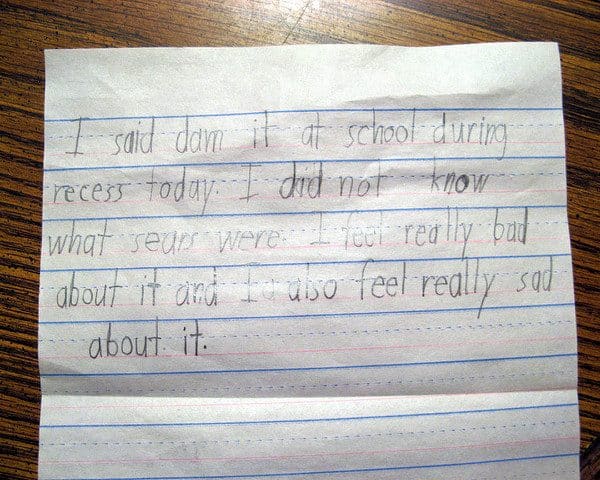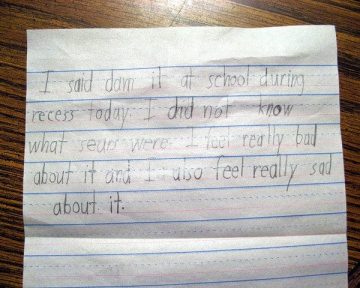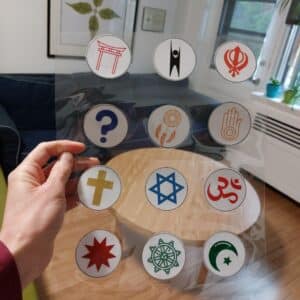How can repentance help me every day?
Repentance can be a very difficult subject. You want to help the girls learn how to recognize when they’ve done something wrong and to improve upon that, but you don’t want to instill shame. I think as an opening activity, I would ask one of the girls to tell the story of the Council in Heaven. In the story, Satan wants to make every one do the “right” thing, but Christ advocates for agency. This story tells us that making mistakes is something that we know will happen and it’s part of the Plan to make mistakes. Doing the wrong thing means simply that we did something wrong; it does not mean that we are therefore “bad” people. In the class, I might emphasize that again: doing something wrong does not mean we, ourselves, are bad and undeserving of love, mercy, and forgiveness.
As I was preparing this lesson, I wanted to find a story of a young woman’s own experience repenting and I remembered the story of Zina D. H. Young, who had the gift of tongues, but then “checked” it and lost the gift. Zina wrote this in the Young Women’s Journal, Volume 4, 1893:
Soon after this [my baptism], the gift of tongues rested upon me with overwhelming force. I was somewhat alarmed at this strange manifestation, and so checked its utterance. What was my alarm, however, to discover that upon this action upon my part, the gift left me entirely, and I felt that I had offended that Holy Spirit by whose influence I had been so richly blessed.
I suffered a great deal in my feelings over this matter, and one day while mother and I were spinning together, I took courage and told her of the gift I had once possessed, and how, by checking it I had lost it entirely.
Mother appreciated my feelings and told me to make it a matter of earnest prayer, that the gift might once more be given to me.
I walked down to a little spring in one of the meadows, and as I walked along I mused on my blessing and how I had turned away the Spirit of God. when I reached the spring, I knelt down and offered up a prayer to God and told Him if He could forgive my transgression, and give me back the lost gift, I would promise never to check it again, no matter where or when I felt its promptings.
I have kept this vow, but it has been a heavy cross at times, for I know that this gift is the least of all gifts, and it is oftentimes misunderstood and even treated lightly by those who should know better. Yet it is a gift of God, and should not be despised by him who receives it, but magnified to its extent, even as the lowest grade of the priesthood is the least of all, and yet it needs be magnified as earnestly as are the higher and greater offices.
Sharing this story with the class, questions to discuss could include: What had Zina done wrong? Why was it wrong? Who did she turn to for help? How did she reconcile this with God?
Zina D. H. Young went on to be the third president of the Relief Society: a great example of how doing something wrong and needing to fix it doesn’t mean you are a ‘bad’ person.
One of the scriptures in the lesson plan that caught my eye was Mosiah 27, which is the story of how Alma the Younger and the sons of Mosiah went around speaking badly about the church but then repented of it. Have the class read verses 8-10, 29-30, 35-36. Good discussion questions might include: how did Alma and the sons of Mosiah feel about what they had done wrong? How did they right their wrong?
I think one of the hardest parts of repentance is apologizing to the person we’ve wronged. It’s easy to pray for forgiveness- God is very merciful, but admitting wronging another person can be intimidating. I think role playing apologies in partners would be a good idea. If you need some ideas, here are things I had done as a youth/teen that needed to be righted. Feel free to come up with your own or ask the class if they have an incident they can remember- maybe it’s something they need to still apologize for and practicing in class can help them get the courage to do it.
- Misquoted a teacher in a school newspaper to fill up more space.
- Called my siblings names/stupid/was generally ornery to them.
- While working on a school group project, I fooled around a lot and didn’t really help my partner with the work.
- Said something mean about a friend behind her back.
- Blamed a friend who was sick from school and couldn’t speak for herself, for something I did the day before.
In the Alma and sons of Mosiah story, they tried to make reparations for their wrong-doings. When we apologize to someone it can be a good idea to ask, “How can I make this up to you?”
At the end, you could ask the class to write down in their journals at home something they might need to apologize for and try it out. Share your own experience with mending relationships through apology and repentance.
I believe relationships are important and through repentance and apology, we can help mend them. In our humility to consider how we’ve wrong others, we learn compassion and understanding of others. Yes, we will make mistakes and we will have to help fix them and that is good and all part of the plan.
The love Christ commands requires a mighty change and great humility. It requires us to forsake pride and to be stripped of envy. It requires that we neither mock our sisters and brothers nor persecute anyone. Christ knew that for us to find any of those characteristics in ourselves would be onerous and would demand our great effort just to look. He said, “If thy and or thy foot offend thee, cut them off, and cast them from thee” (Matt. 18:8). He was not suggesting our mutilation, but rather showing his awareness of how painful clearing ourselves of such offenses could be. When we have made the changes that only we can make, then, by the atoning blood of Christ, we may receive the forgiveness that only he can bring. The reciprocal nature of those actions suggests the high trust and respect the Lord has for our abilities. Anyone who has had experience with the Lord’s love knows of the sure courage that comes when we keep our part of that trust and
honor him by seeking his Spirit and by living the best we can.Aileen H. Clyde, Relief Society Presidency
“Covenant of Love.” Ensign, May 1995
This lesson was originally written for Young Women in 2014 on the topic, How can repentance help me every day?







3 Responses
First I want to thank you for doing this, I straight up dropped the ball on sending reminders. Ten gold stars for accountability! (for you, not me obviously)
I really like this lesson. You’re absolutely right that it is so hard to walk that line between calling to repentance and shaming people. It is also hard to share personal experiences where you illustrate how bad you felt and how much you needed repentance without sharing something maybe inappropriate. Tricky, tricky. I really like this lesson plan. I like the example of Zina in part because so often our stories of leaders (in the scriptures or our dispensation) are so highly sanitized you’d think Nephi never had a cross moment. I feel like this story is a good parallel to that one about Joseph Smith losing the ability to translate because of how he had treated Emma. I also like that it is her mom who counsels her. She goes to her mom with a concern about a mistake and her mom helps her to see how to fix it. While not everyone has a good relationship with parents or has parents who would guide correctly, I like the idea that your first line of defense is not necessarily going to confess to the bishop.
This is hands down a fantastic lesson!! I love your opening, I love your Zina story, and I love the Aileen Clyde quote. This is pure gold.
[…] to go over in meaningful detail. Having been freshly inspired by TopHat’s great Young Women lesson plan on repentance (oh, how I would have loved her lesson when I was in Young Women!), I chose to focus on […]